ASUS Vivobook S14 (2025) Review: Ultra 7 Power Meets a Budget Display

ASUS’s Vivobook S series has always aimed to bring high-end internals into a relatively affordable thin-and-light chassis. This year, the 14-inch Vivobook S14 (2025) gets a serious upgrade under the hood with Intel’s new Core Ultra 7 255H chip, while retaining the familiar lightweight design. On paper, it seems like a killer package for around ₹90,000, but does the real-world experience match the spec sheet?
ASUS Vivobook S14 (2025) – Specifications
- Processor: Intel Core Ultra 7 255H (16-core, 22-thread, up to 4.8 GHz)
- GPU: Intel Arc 140T GPU (Alchemist Architecture)
- RAM: 16GB LPDDR5X
- Display: 14-inch FHD+ (1920×1200), 60Hz
- Storage: 512GB PCIe Gen 4 SSD
- Battery: 70Wh
- Weight: ~1.3kg
- Ports: 2x USB-C (PD + DP), 2x USB-A, HDMI 1.4, 3.5mm combo jack
- Camera: 1080p IR Webcam with shutter
Also read: ASUS ROG Flow Z13 (2025) Review: A Gaming Revolution in Tablet Form
ASUS Vivobook S14 (2025) Review: Design, Build Quality, Keyboard & I/O
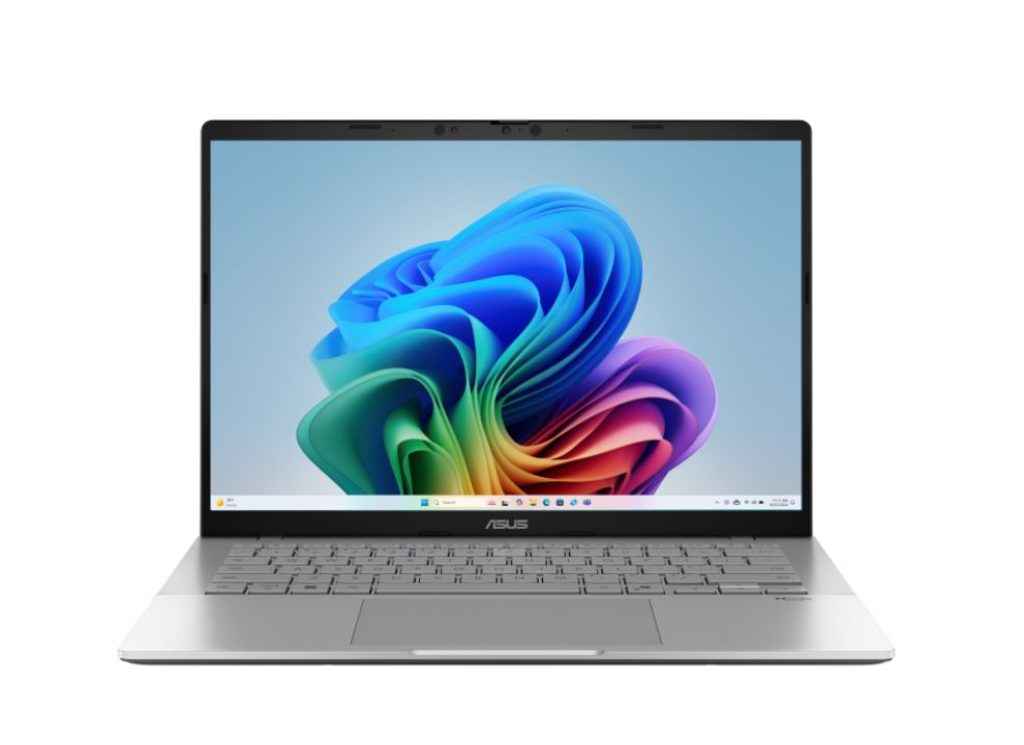
The ASUS Vivobook S14 features a balanced blend of metal and polycarbonate in its construction. The lid is metallic, while the deck is made of plastic, striking a thoughtful compromise between durability and weight. In hand, the device feels solid and well-built, with only a slight flex near the touchpad. The mechanical touchpad itself is larger than expected, smooth, and highly precise, clearly designed with usability in mind. The keyboard also performs well, offering ample key travel and tactile feedback that make long typing sessions genuinely comfortable.
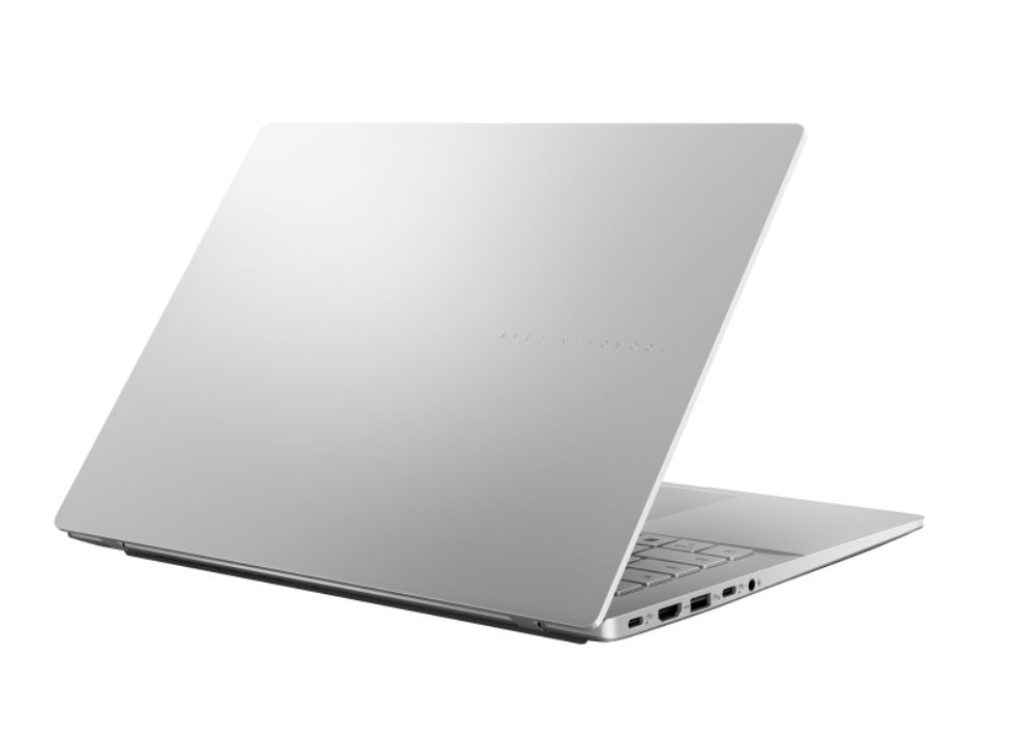
Adding to its appeal is a refined design language. The hinge opens smoothly with one hand, and the laptop maintains a slim profile at just 1.59cm thick and a featherlight 1.35kg, enhancing portability. A CNC-engraved logo adds a subtle touch of elegance, while the clean, straight-line aesthetic keeps things minimal and professional. Available in a neutral colour palette with a metallic finish, the Vivobook S14 feels stylish without being loud, an ideal choice for both work and personal use-cases.
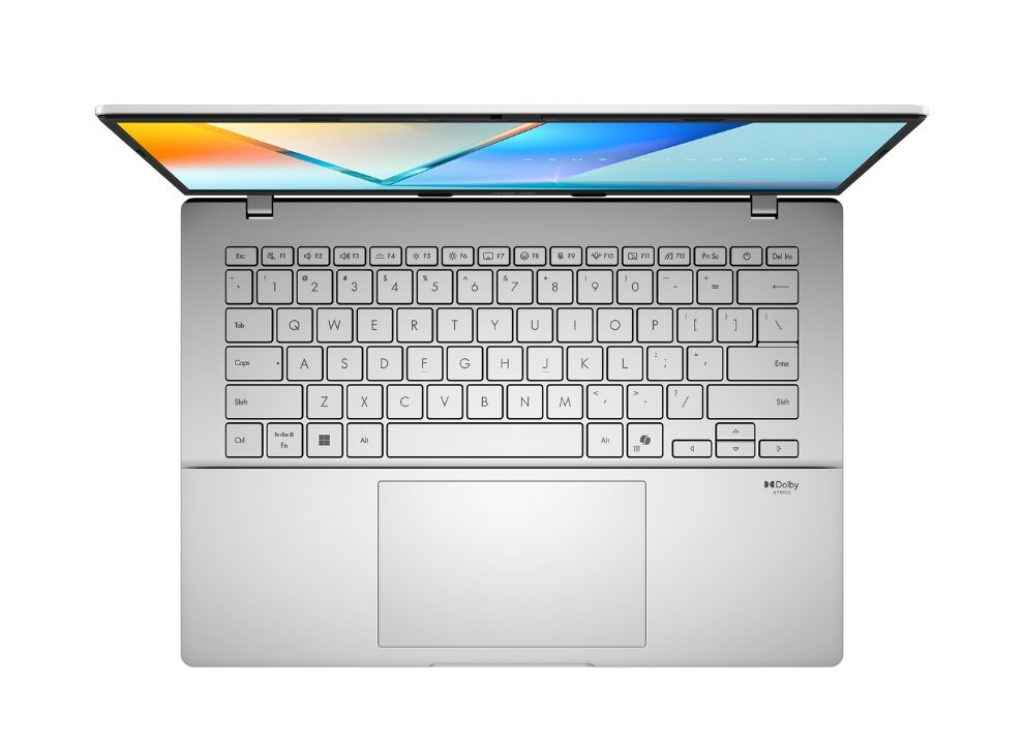
Durability hasn’t been overlooked either. ASUS has subjected the Vivobook S14 to rigorous MIL-STD 810H military-grade testing, which includes high and low temperature exposure, shock, and vibration tests. It also features a physical webcam privacy shutter and an IR camera built into the top bezel for secure facial recognition, which explains the slightly thicker upper frame.
As for ports, it’s a balanced layout – 2x USB 3.2 Gen 1 Type-C (with DisplayPort 1.2 and Power Delivery 3.0), 1x USB 3.2 Gen 1 Type-A (left), 1x USB 3.2 Gen 1 Type-A (right), 1x HDMI 1.4, and a 3.5mm combo audio jack.

ASUS Vivobook S14 (2025) Review: Display & Audio Performance
In terms of display, the Vivobook S14 starts to lose ground. The 14-inch IPS panel is matte and anti-reflective, handy under office lighting. But beyond that, it’s fairly underwhelming. With just 52.7% sRGB, 42.2% DCI-P3, and 46.2% NTSC coverage, it doesn’t meet 2025 standards for colour performance. The average Delta E of 4.9 further highlights poor colour accuracy, making it unfit for any colour-sensitive work or content creation.
Even casual media consumption feels lacklustre due to the dull tones and standard 60Hz refresh rate. The bottom-firing speakers don’t do much to compensate either, they’re usable in quiet environments but easily overpowered by ambient noise.
Also read: ASUS ExpertBook P1 First Impressions: A No-Nonsense Business Workhorse with Surprising Power
ASUS Vivobook S14 (2025) Review: Performance, Thermals & Benchmarks
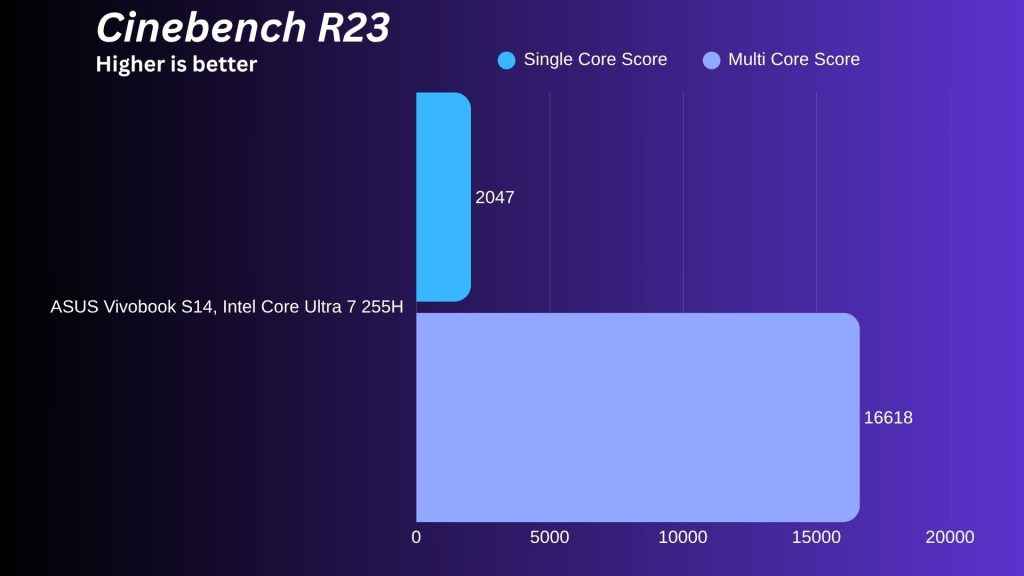
Performance is where the ASUS Vivobook S14 with the Intel Core Ultra 7 255H really flexes its muscle. In Cinebench R23, the laptop clocked 16,618 points in the multicore test and 2,047 in the single-core run.
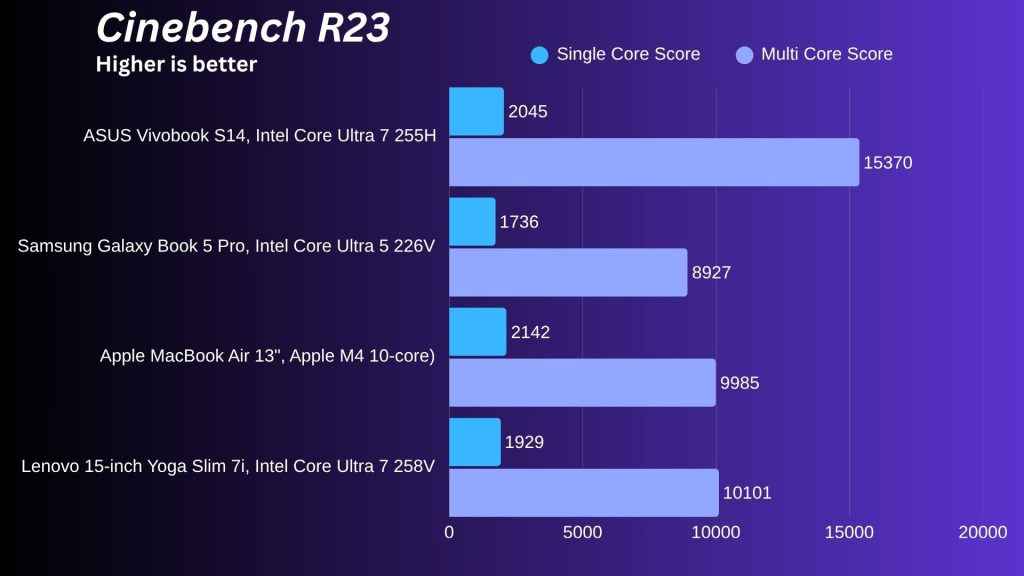
Even under sustained load, it managed a throttled multicore score of 15,370 and a single-core score of 2,045, very respectable numbers. Compared to Apple’s 10-core M4 chip, the 255H edges ahead in multi-core tests (as seen in Cinebench 2024) but still trails in single-core where Apple remains ahead. That said, day-to-day tasks like browsing, multitasking, and even light editing feel snappy and fluid.
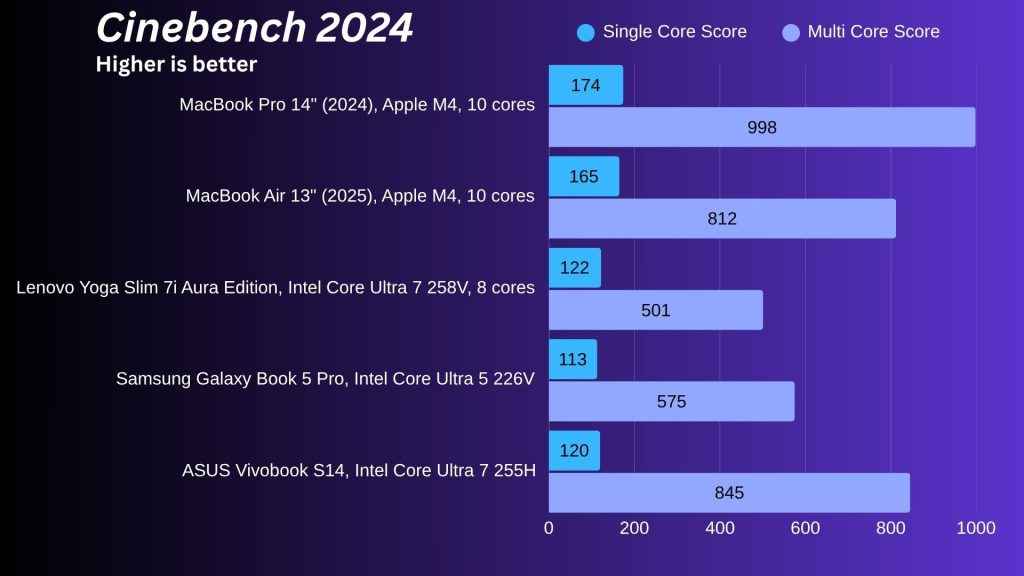
In the DaVinci Resolve 4K render test, however, the Vivobook S14 took 325 seconds to export, a noticeable gap from the 140 seconds of the MacBook Air M4 and 200 seconds on the Galaxy Book 5 Pro with the Ultra 5 226V. So, for serious content creators, this may not be ideal.
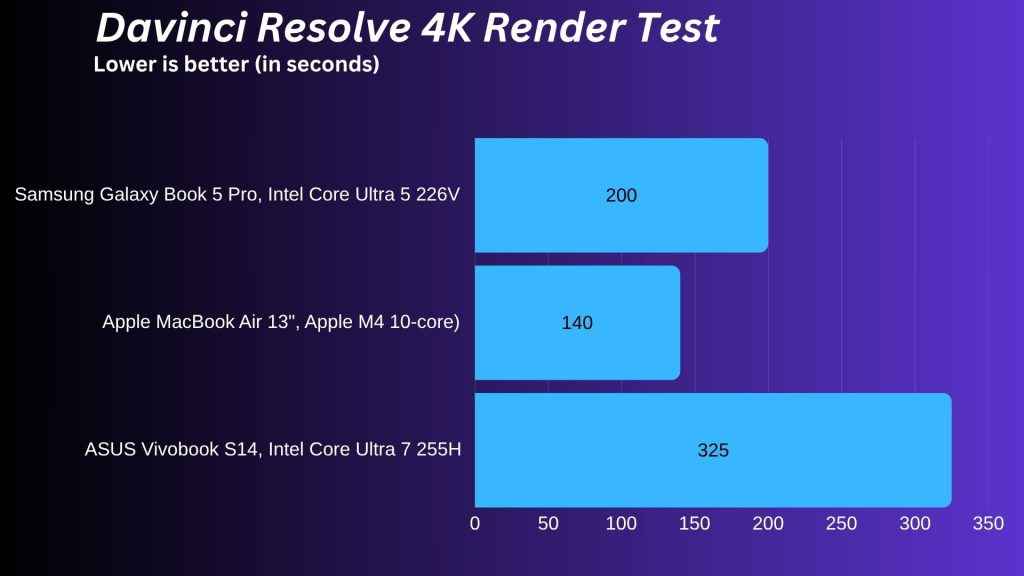
In Geekbench 6 GPU tests, the integrated Alchemist-based GPU in the 255H scored 24,067. That’s higher than the Galaxy Book 5 Pro (22,914) but falls behind the Yoga Slim 7i with the 258V (26,132) and Apple M4 (30,965), which continues to lead in GPU tasks.
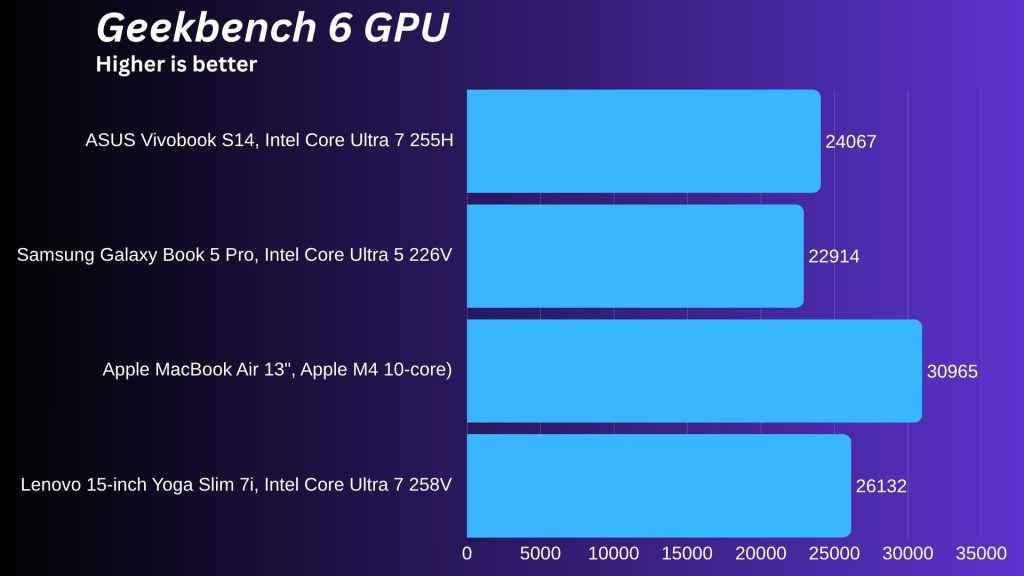
When it comes to real-world gaming, the Vivobook S14 manages 25 FPS in GTA V, 32 FPS in Dirt 5, and 33 FPS in Shadow of the Tomb Raider at 1080p low settings. These aren’t gaming laptop numbers, but they’re playable for light casual titles.
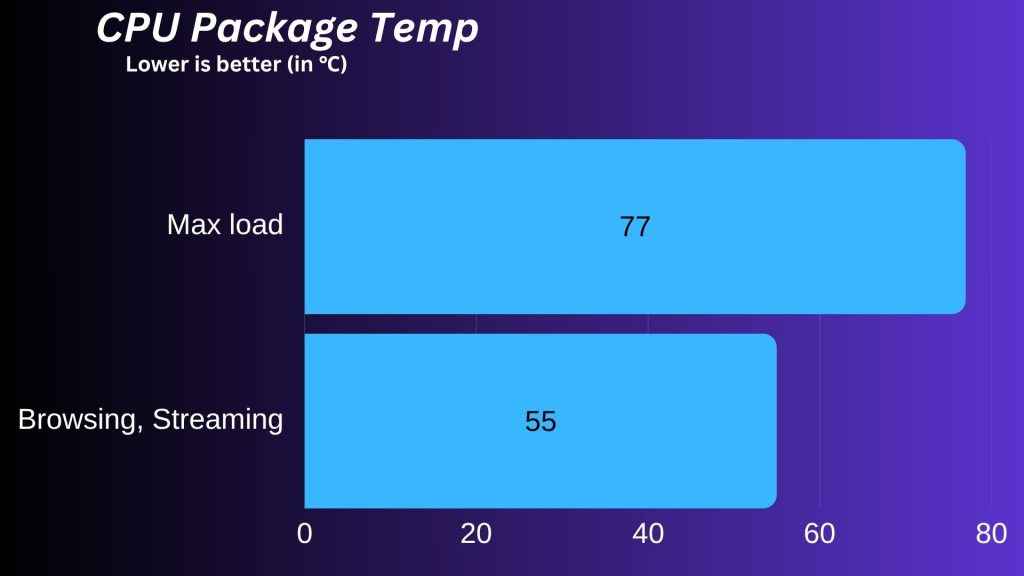
Thermals and efficiency are equally well handled. At max load, the CPU sips around 35W of power, idles at roughly 15W, and holds a peak temperature of 77°C, while idle temps hover around 55°C. After a 30-minute gaming session, the surface temperature remained a manageable 35-36°C.
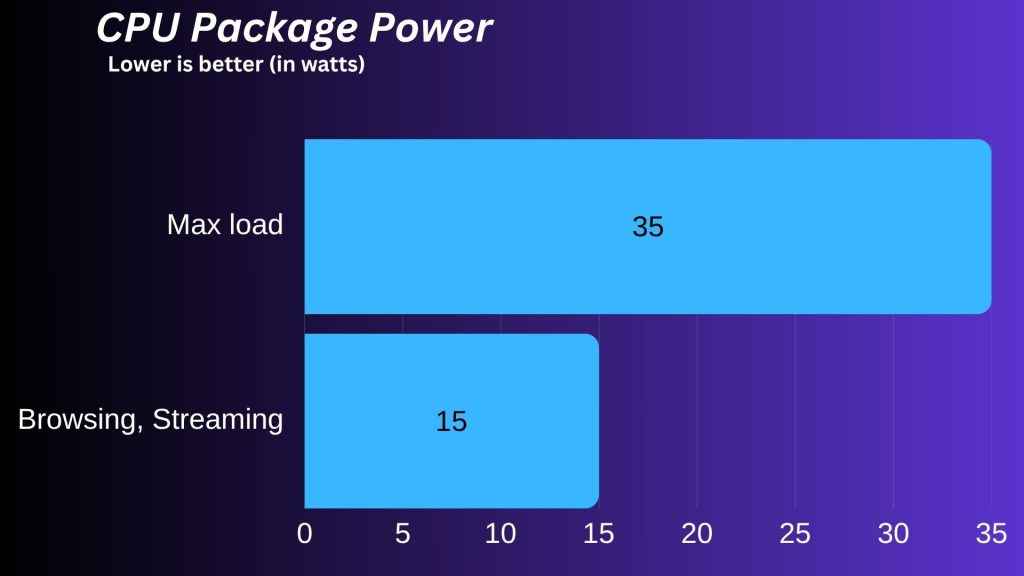
All of this makes the laptop a reliable performer for most non-gaming intensive workloads.
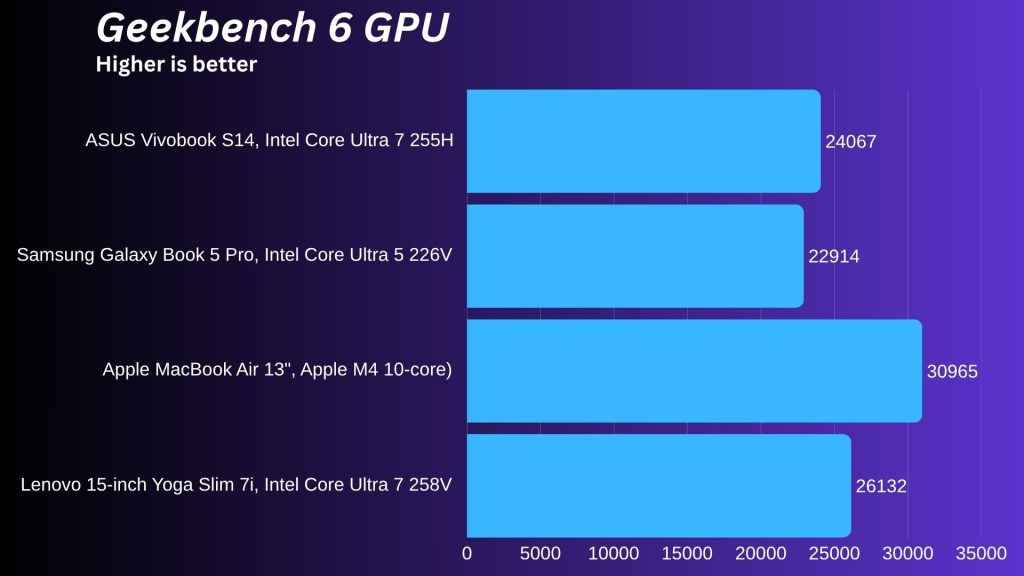
When it comes to GPU performance, the integrated Alchemist iGPU in the Vivobook S14 delivers a decent experience for casual users. In Geekbench 6, the GPU score trails behind both the newer Intel 258V chip and Apple’s M4, which benefit from better iGPUs or Apple’s unified memory setup.
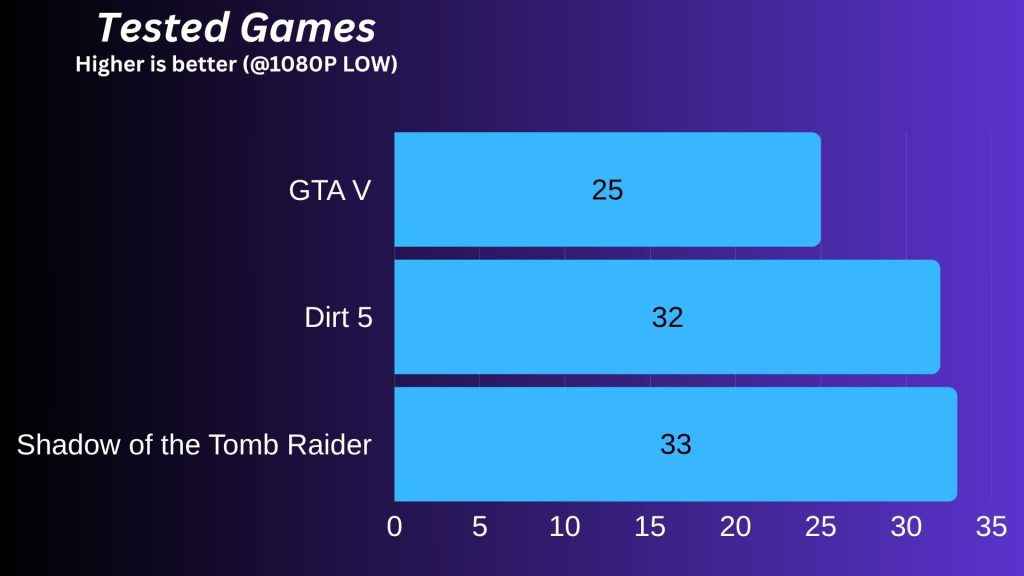
In real-world gaming tests, the ASUS Vivobook S14’s integrated graphics managed around 33 FPS in Shadow of the Tomb Raider, 32 FPS in Dirt 5, and 25 FPS in GTA V—all at 1080p Low settings. These frame rates are passable for casual play but far from ideal for demanding AAA titles. The Alchemist iGPU is suitable for light gaming and older or less intensive titles, but it struggles to deliver smooth performance in graphically intensive games or anything involving ray tracing.
ASUS Vivobook S14 (2025) Review: Battery life performance
When it comes to battery life, the ASUS Vivobook S14 performs decently for a Windows ultrabook. In everyday use, like browsing the web or streaming content, you can expect around 7.5 hours on a full charge. However, during intensive tasks such as gaming, the battery drains much faster, lasting just about 1 hour and 20 minutes.
While it doesn’t match the exceptional efficiency of a MacBook Air or newer Lunar Lake-powered laptops, it’s still enough for most users to get through a workday focused on light productivity, communication, and media consumption.
ASUS Vivobook S14 (2025) Review: Verdict
The ASUS Vivobook S14 (2025) is a well-built, high-performing thin-and-light laptop held back by a poor display and weak speakers. The Core Ultra 7 255H is excellent, both in raw performance and power efficiency. You also get decent battery life, a solid port selection, and thoughtful extras like an IR camera and privacy shutter. But at ₹90,990, it’s hard to ignore the alternatives:
- Vivobook S15 OLED (2024): ₹81,990 – Better display, faster CPU (i9-13900H)
- MacBook Air M4 (2025): ₹91,900 – Better display, speakers, and battery
- Lenovo Yoga Slim 7i: ₹75,990 – OLED screen + Ultra 7
If ASUS brings the price down to ~₹70,000, this could be a great general-purpose pick. But at current pricing, it’s hard to recommend over OLED rivals with better screens and comparable performance.
Yetnesh Dubey
Yetnesh works as a reviewer with Digit and likes to write about stuff related to hardware. He is also an auto nut and in an alternate reality works as a trucker delivering large boiling equipment across Europe. View Full Profile
